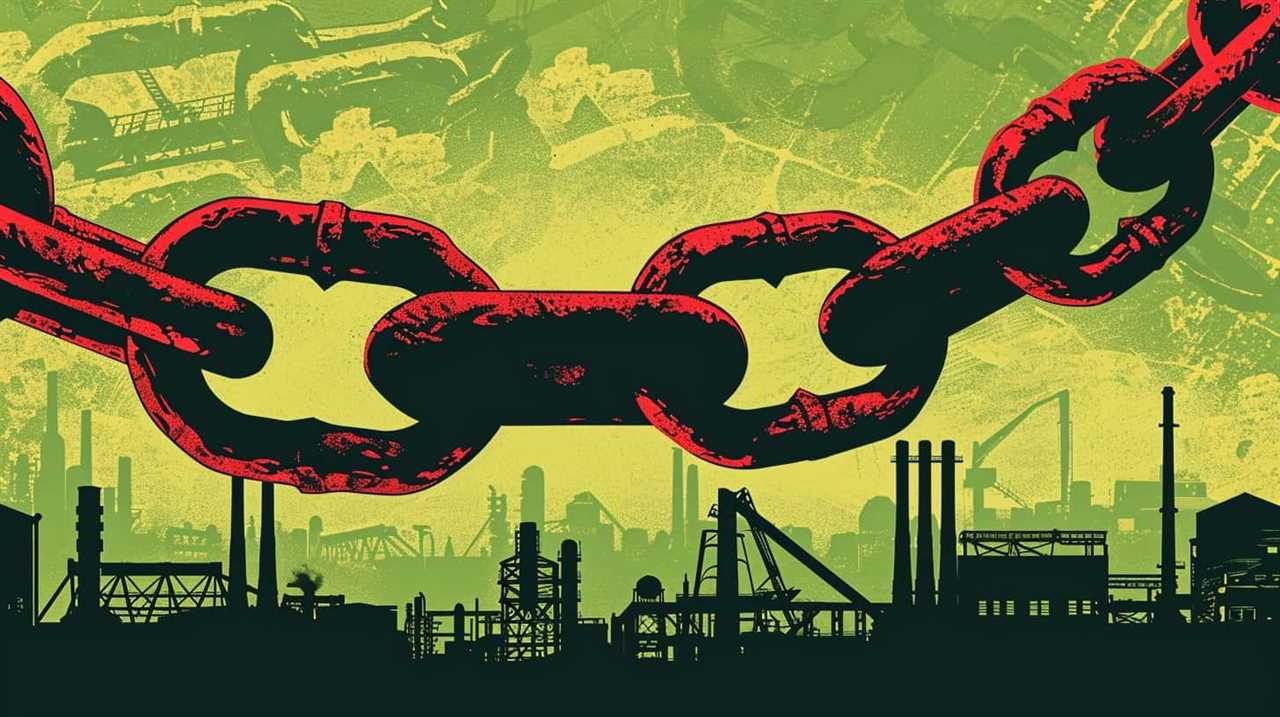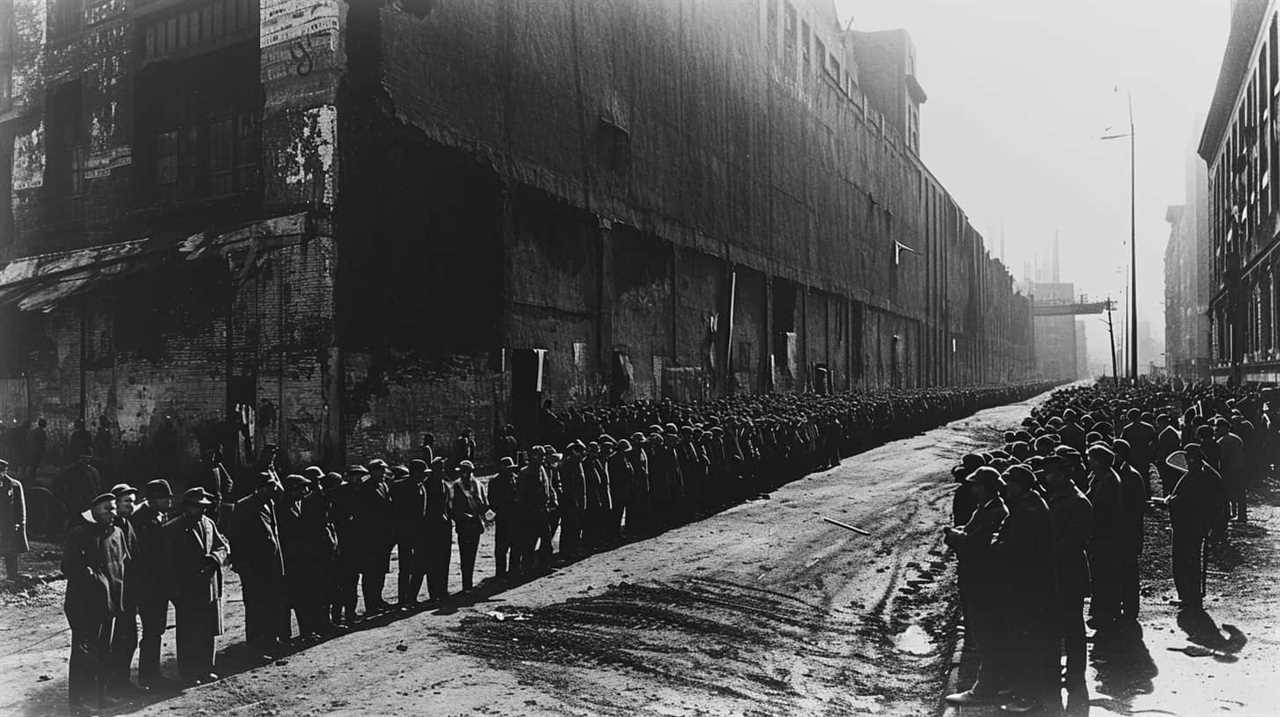Did you know that the lasting impact of Thomas Mun, a prominent mercantilist thinker from the 17th century, still influences our comprehension of economic theory?
In this exploration, we delve into Mun’s contributions to mercantilism and uncover their relevance in today’s innovative world.
Mun’s definition of mercantilism, his emphasis on the balance of trade, and his views on export surpluses provide valuable insights into the historical context of trade and its impact on economies.
As we examine Mun’s theories, we also consider the criticisms they have faced and how they fit within the broader narrative of trade throughout history.

Join us on this journey to discover the enduring legacy of Mun’s economic ideas and their significance in modern perspectives on mercantilism.
Key Takeaways
- Mercantilism emerged in Europe during the 16th and 17th centuries as a response to economic conditions, aiming to maximize national wealth and power through trade and colonization.
- Thomas Mun made significant contributions to mercantilist economic thought, emphasizing the importance of a nation’s balance of trade and the accumulation of wealth through exports.
- Mun’s ideas shaped policies and practices governing international trade for centuries, influencing protectionist measures, promotion of domestic industries, and colonial policies.
- Mun’s emphasis on maintaining a favorable balance of trade, advocating for protectionism, and recognizing the significance of stable currency and a strong navy continues to influence policymakers today in addressing trade imbalances, shaping industrial policies, and regulating international trade.
The Origins of Mercantilism
One of the key factors in understanding the origins of mercantilism is the emphasis on national wealth and economic power. Mercantilism emerged in Europe during the 16th and 17th centuries as a response to the prevailing economic conditions of the time. It was heavily influenced by the prevailing political and social climate and aimed to maximize the wealth and power of nations through trade and colonization.
The origins of mercantilism can be traced back to several influences. One of the main influences was the desire for economic self-sufficiency and national security. European nations sought to protect their economies from foreign competition and ensure a favorable balance of trade. This led to the adoption of policies such as tariffs, subsidies, and monopolies to promote domestic industries and restrict imports.
Another influence on the origins of mercantilism was the prevailing political ideology of the time. Absolute monarchies, such as those in Europe, viewed the accumulation of wealth and power as essential to their rule. Mercantilist policies were seen as a means to strengthen the nation and consolidate the authority of the monarch.

Thomas Mun: A Mercantilist Thinker
Thomas Mun, a prominent figure in mercantilist economic thought, made significant contributions to the development of the theory. His work emphasized the importance of a nation’s balance of trade and the accumulation of wealth through exports.
Mun’s ideas had a lasting impact on mercantilism, shaping policies and practices that governed international trade for centuries. Even today, his insights continue to shape our understanding of economic nationalism and the pursuit of national economic interests.
Mun’s Economic Contributions
We will delve into the economic contributions of Mun, a prominent mercantilist thinker. Mun’s policy recommendations and his understanding of the role of government in mercantilism have had a lasting impact on economic thought.
Here are five significant contributions Mun made to the field:

- Mun emphasized the importance of a favorable balance of trade, advocating for the export of goods and the limitation of imports.
- He argued that the government should actively intervene in the economy to promote industries that would increase domestic production and exports.
- Mun advocated for the establishment of colonies to secure sources of raw materials and serve as markets for manufactured goods.
- He recognized the importance of monetary policy, advocating for the maintenance of a stable currency to promote economic growth.
- Mun highlighted the significance of a strong navy to protect trade routes and ensure the security of a nation’s economic interests.
Mun’s economic contributions laid the foundation for the development of mercantilist policies and continue to influence economic thinking to this day.
Mercantilism’s Lasting Impact
Thomas Mun, a prominent mercantilist thinker, made significant economic contributions that had a lasting impact on the development of mercantilism. Mun’s ideas emphasized the importance of a positive balance of trade, advocating for the accumulation of precious metals as a measure of a nation’s wealth and power. His belief in protectionism and the promotion of domestic industries to achieve self-sufficiency influenced mercantilist policies across Europe.
Mun’s work also highlighted the role of colonies in securing a steady supply of raw materials and markets for manufactured goods, which shaped colonial policies of the era. His economic contributions laid the foundation for mercantilism and influenced economic policies for centuries to come.
Mun’s Influence Today?
Continuing from the previous subtopic, our exploration of Mun’s legacy in mercantilist economic thought reveals the enduring relevance of his ideas today. Thomas Mun’s contributions continue to shape and influence modern economic policies in several ways:

- Balancing trade deficits: Mun’s emphasis on maintaining a favorable balance of trade continues to guide policymakers in their efforts to address trade imbalances and ensure economic stability.
- Protectionism: Mun’s advocacy for protectionist measures to safeguard domestic industries resonates with contemporary debates on free trade versus protectionism.
- Industrial policy: Mun’s emphasis on developing and promoting domestic industries aligns with modern approaches to industrial policy aimed at fostering economic growth and competitiveness.
- Trade regulations: Mun’s insights into the importance of regulating international trade have informed the development of global trade frameworks, such as the World Trade Organization, which seek to establish and enforce fair trade practices.
- Economic nationalism: Mun’s ideas on economic nationalism, emphasizing the promotion of national interests, continue to influence governments’ economic strategies in an increasingly globalized world.
Mun’s relevance in today’s economic policies and his impact on international trade regulations highlight the lasting significance of his contributions to the field of mercantilist economic thought.
Mun’s Definition of Mercantilism
Mun’s definition of mercantilism encompasses a set of economic policies aimed at promoting a nation’s wealth and power through the accumulation of precious metals, the development of domestic industries, and the expansion of international trade.
His key contributions to mercantilist thought include emphasizing the importance of a favorable balance of trade, advocating for protectionist measures such as tariffs and subsidies, and highlighting the significance of colonies in securing resources and markets for the mother country.
Mun’s ideas had a profound impact on economic policies during the mercantilist era, shaping the strategies pursued by nations in their pursuit of economic prosperity and national strength.

Mun’s Key Contributions
Our exploration of Mun’s legacy in mercantilist economic thought brings us to an examination of his key contributions, particularly his definition of mercantilism. Mun’s influence in shaping mercantilist ideology can’t be overstated. His insights provided a foundation for understanding the role of the state in economic affairs during the early modern period.
Some of Mun’s key contributions include:
- Conceptualizing mercantilism as a system that aimed to increase a nation’s wealth through the accumulation of precious metals and the promotion of export-led growth.
- Emphasizing the importance of a favorable balance of trade, where a country should export more than it imports to achieve economic prosperity.
- Arguing for the implementation of protectionist measures, such as tariffs and subsidies, to foster domestic industries and reduce reliance on foreign goods.
- Advocating for the establishment of colonies as sources of raw materials and captive markets for manufactured goods.
- Recognizing the significance of a strong navy in securing overseas trade and protecting national interests.
These contributions laid the groundwork for subsequent economic theories and policies, making Mun a key figure in the development of mercantilism.
Mercantilism’s Economic Impact
With a clear understanding of Mun’s key contributions to mercantilist economic thought, we can now delve into the economic impact of mercantilism as defined by Mun. Mercantilism, with its focus on accumulating wealth and maximizing exports, had a significant impact on global trade during the 16th to 18th centuries. This economic philosophy promoted the idea that a country’s wealth and power were determined by its ability to export more than it imported. As a result, nations implemented policies such as tariffs, subsidies, and monopolies to protect domestic industries and ensure a favorable balance of trade.

To further illustrate mercantilism’s economic impact, let’s take a look at the following table:
| Positive Impact | Negative Impact |
|---|---|
| Increased exports and economic growth | Limited market access for other nations |
| Development of domestic industries | Inefficient allocation of resources |
| Accumulation of wealth and precious metals | Trade wars and conflicts |
| Creation of a favorable balance of trade | Unequal distribution of wealth |
| Expansion of colonial territories | Exploitation of indigenous populations |
Furthermore, mercantilism’s influence on colonialism cannot be overlooked. European powers heavily relied on mercantilist policies to exploit colonies for their natural resources and as captive markets for manufactured goods. This led to the establishment of colonial empires and the exploitation of indigenous populations for economic gain.
The Importance of the Balance of Trade
We must delve into the significance of maintaining a favorable balance of trade within the framework of Mun’s legacy in mercantilist economic thought.
The balance of trade refers to the difference between a country’s exports and imports. In the context of mercantilism, a positive balance of trade was seen as crucial for economic prosperity and national power.

Here are five key reasons why the balance of trade was considered important:
- Economic Stability: A favorable balance of trade ensured a steady inflow of wealth into the country, which supported economic stability and growth.
- National Security: A positive balance of trade allowed countries to accumulate precious metals and resources, strengthening their national security and reducing dependence on foreign powers.
- Job Creation: Maintaining a surplus in the balance of trade promoted domestic industries, creating job opportunities and stimulating economic development.
- The Role of Tariffs: By imposing tariffs on imports, countries aimed to protect domestic industries and maintain a favorable balance of trade by reducing reliance on foreign goods.
- The Impact of Trade Deficits: Trade deficits, where imports exceed exports, were seen as detrimental to a country’s economy. It was believed that trade deficits drained wealth and weakened the nation.
Understanding the importance of the balance of trade in mercantilist economic thought sets the stage for exploring Mun’s views on export surpluses.
Mun’s Views on Export Surpluses
Mun emphasized the significance of export surpluses in promoting economic growth and national power within the framework of mercantilist economic thought. According to Mun, export surpluses were a key driver of economic prosperity for nations. He believed that by exporting more goods than they imported, countries could accumulate wealth and strengthen their economies.
Mun argued that export surpluses had several implications for a nation’s economic well-being. Firstly, they could generate revenue through the sale of goods to foreign markets, which could then be reinvested in domestic industries and infrastructure. Secondly, export surpluses could lead to the development of a favorable balance of trade, as the value of exports exceeded that of imports. This, in turn, could result in a stronger currency and increased purchasing power for the nation.

Additionally, Mun believed that export surpluses could enhance a country’s national power and influence. By amassing wealth and resources, nations could bolster their military capabilities, expand their territories, and establish themselves as dominant players in global affairs.
Mun’s views on export surpluses thus highlighted their potential to drive economic growth, enhance a nation’s economic position, and increase its power and influence on the world stage.
The Role of Colonies in Mercantilism
When examining the role of colonies in mercantilism, several key points come to light.
First, colonial wealth accumulation was a central component of the mercantilist system, with colonies serving as sources of valuable resources and raw materials.

Second, trade imbalances were inherent in mercantilism, as colonies were expected to export more than they imported, ensuring a surplus for the mother country.
Lastly, the exploitation of colonies played a significant role in the mercantilist economic model, with colonies being seen as a means to enrich the mother country through forced labor and monopolistic control over trade.
Colonial Wealth Accumulation
Examining the role of colonies in mercantilism, colonial wealth accumulation played a crucial role in shaping the economic thought of Mun. The colonies served as valuable sources of raw materials, providing the mother country with abundant resources for production and trade.
This exploitation of colonial resources allowed for the accumulation of wealth and power. Mun believed that the colonies were essential for maintaining a positive balance of trade, as they provided a steady supply of goods for export.

Additionally, trade regulations imposed by the mother country ensured that the colonies remained dependent on the mother country for finished goods, further contributing to wealth accumulation. The colonies acted as a means to secure economic prosperity and dominance, fueling the mercantilist ideas of Mun and the subsequent development of economic thought.
Trade Imbalances and Exploitation
In exploring the role of colonies in mercantilism, we delve into the trade imbalances and exploitation that shaped Mun’s legacy in economic thought.
Trade imbalances were a central feature of mercantilism, with colonial territories serving as sources of raw materials and markets for finished goods. This system allowed the colonial powers to accumulate wealth and maintain favorable trade balances.
However, these imbalances came at a cost, as colonies were often exploited for their resources and labor. The extraction of resources from colonies without fair compensation contributed to the global exploitation that characterized mercantilism. This exploitation was justified by the belief that colonies existed solely for the benefit of the mother country.

Mun’s Concept of Bullionism
Mun’s concept of bullionism shaped mercantilist economic thought by emphasizing the importance of accumulating and safeguarding precious metals as a means of increasing a nation’s wealth. Bullionism, a key aspect of mercantilist trade policies, advocated for the accumulation of gold and silver through trade surpluses. This concept laid the foundation for the belief that a nation’s wealth was measured by the amount of bullion it possessed.
- Bullion reserves were seen as a source of economic power and national security.
- Mercantilist thinkers believed that a positive balance of trade, achieved through exporting more than importing, would lead to the accumulation of bullion.
- Government intervention in the economy was considered crucial to promote exports and limit imports, ensuring a favorable balance of trade.
- Restrictions on the outflow of bullion were implemented, such as tariffs and bans on the export of precious metals.
- Mun’s bullionism influenced policies that favored domestic industries and protectionism, as they aimed to reduce imports and increase exports to accumulate more bullion.
Mun’s concept of bullionism not only shaped mercantilist economic thought but also influenced the development of economic policies in subsequent centuries. The emphasis on accumulating bullion as a measure of wealth, as well as the belief in government intervention in international trade, laid the groundwork for future economic theories and policies.
Mercantilist Policies and Regulations
Our analysis of Mun’s concept of bullionism leads us to consider the specific mercantilist policies and regulations that were influenced by his ideas.
Mercantilism, a dominant economic theory during the 16th to 18th centuries, aimed to increase a nation’s wealth by maximizing exports and minimizing imports. To achieve this goal, governments implemented a range of regulations.

One key mercantilist policy was the establishment of tariffs and quotas on imports. These measures aimed to protect domestic industries by limiting competition from foreign goods. By imposing high tariffs, governments sought to encourage domestic production and boost exports, thereby increasing their bullion reserves.
Another significant regulation was the promotion of monopolies and the granting of exclusive trading rights. Governments often granted licenses to specific companies, giving them a monopoly over certain goods or trade routes. These monopolies allowed governments to control and regulate trade, ensuring that profits stayed within their borders and minimizing the outflow of bullion.
Moreover, mercantilist regulations extended to the encouragement of colonies and the establishment of colonial trade networks. Colonies were seen as sources of valuable raw materials and markets for finished goods. Governments enacted policies to ensure that colonies exclusively traded with the mother country, further bolstering their control over global trade.
Mun’s Influence on Economic Nationalism
Mun’s nationalist economic ideas had a significant impact on trade policies during his time. His emphasis on promoting domestic industries and protecting them from foreign competition laid the foundation for economic nationalism.

Mun’s ideas influenced the development of policies such as tariffs, subsidies, and restrictions on imports and exports, all aimed at ensuring the economic prosperity and self-sufficiency of the nation.
Mun’s Nationalist Economic Ideas
Economic nationalism, influenced by Mun’s nationalist economic ideas, played a significant role in shaping mercantilist economic thought. Mun’s emphasis on promoting domestic industries and protecting national wealth led to the emergence of economic nationalism as a key component of mercantilism. His ideas centered around prioritizing domestic production and promoting exports while limiting imports.
Mun believed that a nation’s wealth could be measured by its accumulation of precious metals, and therefore advocated for policies that aimed to increase the nation’s trade surplus. His ideas also emphasized the importance of strong government intervention in economic affairs, including the use of tariffs and subsidies to support domestic industries.
Mun’s nationalist economic ideas laid the foundation for the development of mercantilist policies that sought to promote national economic strength and prosperity.

Transition: Mun’s nationalist economic ideas not only influenced mercantilist economic thought but also had a significant impact on trade policies.
Impact on Trade Policies
Building on Mun’s nationalist economic ideas, we can see their direct influence on trade policies during the mercantilist era. Mun’s emphasis on economic nationalism and the pursuit of favorable trade balances led to the implementation of protectionist measures by many nations. These policies aimed to promote domestic industries, limit imports, and increase exports, ultimately bolstering the wealth and power of the nation.
As a result, trade wars became more prevalent as countries competed for economic supremacy. This focus on national self-interest had a significant impact on globalization, as it hindered the free flow of goods and services across borders.
The mercantilist era, shaped by Mun’s ideas, set the stage for the ongoing debate on the merits and drawbacks of economic nationalism in today’s globalized world.

The Debate on Mun’s Mercantilist Ideas
In our exploration of Mun’s legacy in mercantilist economic thought, the debate surrounding his ideas has been a subject of considerable interest and analysis. Mun’s mercantilist ideas have sparked a wide range of opinions, with scholars and economists offering contrasting views on their validity and relevance in today’s world. Here are five key points that have emerged from the ongoing debate:
- Mun’s emphasis on promoting domestic industries and protecting national interests through trade policies has drawn criticism for its potential to lead to protectionism and hinder global economic cooperation.
- Supporters argue that Mun’s ideas laid the foundation for the development of modern economic theories and policies, such as strategic trade policies and industrial policy, which aim to build and protect domestic industries.
- Critics question the effectiveness of Mun’s ideas in addressing contemporary challenges, such as the globalization of markets and the interconnectedness of economies.
- Some argue that Mun’s mercantilist ideas can still be relevant in certain contexts, such as developing countries seeking to build a strong industrial base.
- Others suggest that while Mun’s ideas may have been influential in their time, they should be viewed as historical artifacts rather than practical solutions for today’s complex economic landscape.
The debate on Mun’s mercantilist ideas continues to shape discussions on trade policies and economic development, highlighting the ongoing relevance and significance of his contributions to economic thought.
Criticisms of Mun’s Balance of Trade Theory
Although there are differing opinions on Mun’s mercantilist ideas, one particular aspect that has come under scrutiny is his balance of trade theory. Mun’s theory posited that a positive balance of trade, with exports exceeding imports, was essential for a nation’s economic prosperity. However, critics argue that this theory oversimplifies the complexities of international trade and fails to consider other factors that contribute to a country’s economic well-being.
One of the main criticisms of Mun’s balance of trade theory is that it ignores the concept of comparative advantage. According to this alternative theory of trade imbalance, countries should specialize in producing goods in which they’ve a comparative advantage and trade with other countries to obtain goods in which they’ve a comparative disadvantage. This theory suggests that a country’s trade balance isn’t necessarily an accurate indicator of its economic health.

Another criticism of Mun’s theory is that it promotes protectionism and discourages free trade. Mun’s focus on accumulating wealth through a positive balance of trade led to policies such as tariffs and quotas, which hindered international trade and limited the potential benefits of specialization and exchange.
Mun’s Ideas in the Context of Historical Trade
As we delve into the historical trade context, we find that Mun’s ideas on mercantilist economic thought have had a lasting impact. Mun’s views on historical trade and his perspective on international trade have shaped our understanding of economic systems and influenced policies throughout history.
Some key aspects of Mun’s ideas in the context of historical trade include:
- Trade as a zero-sum game: Mun believed that trade was a competition between nations, where one country’s gain was another’s loss. This perspective shaped the way nations approached trade and led to policies aimed at maximizing exports and minimizing imports.
- Colonialism and exploitation: Mun’s ideas on historical trade often aligned with the colonial expansion of European powers. He saw colonies as a means to secure valuable resources and establish a favorable balance of trade.
- Protectionism and tariffs: Mun advocated for protectionist measures, such as tariffs, to promote domestic industries and prevent the outflow of wealth. These policies were implemented by many nations and continue to be debated in modern trade discussions.
- Mercantilist policies: Mun’s ideas formed the basis of mercantilism, a dominant economic theory during his time. This theory emphasized the accumulation of wealth through trade surpluses, state intervention, and the establishment of monopolies.
- Legacy of mercantilism: Mun’s perspective on international trade and his ideas on historical trade laid the foundation for mercantilism, which shaped economic policies for centuries. While some of his theories have been challenged and refined, his influence on economic thought can’t be denied.
As we explore Mun’s ideas in the context of historical trade, it becomes clear that his perspective on international trade has left a lasting legacy.

Now, let’s delve into the subsequent section to further examine the legacy of Mun’s economic theories.
Legacy of Mun’s Economic Theories
Building upon Mun’s ideas in the context of historical trade, we can see that his economic theories have left a lasting legacy. Mun’s economic theories, rooted in mercantilism, continue to have an impact on today’s economic landscape. Despite being criticized for its protectionist policies, mercantilism laid the foundation for modern economic thought and shaped the development of international trade.
One of the key contributions of Mun’s economic theories was the emphasis on a positive balance of trade. He believed that a nation’s wealth was measured by the amount of gold and silver it possessed, and that exporting more than it imported would lead to economic prosperity. While the concept of a positive balance of trade has evolved over time, the idea of promoting exports and protecting domestic industries still holds relevance today.
Furthermore, Mun’s ideas on the role of the state in economic affairs have had a lasting impact. He advocated for government intervention and regulation to promote economic growth and protect domestic industries. This idea of state intervention has been adopted and adapted by various economic systems throughout history, including capitalism and socialism.

Modern Perspectives on Mun’s Mercantilism
Continuing our exploration of Mun’s economic theories, we can now delve into modern perspectives on his mercantilism. Mun, through his work, has had a lasting influence on economic thought, shaping the way we understand and analyze international trade.
Here are five key modern perspectives on Mun’s mercantilism:
- Relevance in a globalized world: Mun’s emphasis on the accumulation of wealth through export surpluses remains relevant today, as nations continue to pursue strategies to strengthen their economies in an interconnected global market.
- Critiques of protectionism: While Mun’s mercantilist ideas supported protectionist policies, modern perspectives often challenge the effectiveness of such measures, highlighting the potential harm they can cause to overall economic welfare.
- Focus on domestic industries: Mun’s emphasis on the development of domestic industries to reduce reliance on imports is still seen as an important strategy for economic growth and self-sufficiency.
- Balance of trade theory: Mun’s theories on the balance of trade, although criticized for their oversimplification, still contribute to our understanding of the relationship between exports and imports in determining a nation’s economic health.
- Influence on economic nationalism: Mun’s ideas have influenced the rise of economic nationalism, with some policymakers advocating for protectionist measures to promote domestic industries and address trade imbalances.
Mun’s mercantilism continues to shape economic discourse and policy decisions today. While some of his ideas have evolved and been refined, his contributions to the understanding of international trade remain significant in modern economic thought.
Frequently Asked Questions
What Were the Main Criticisms of Thomas Mun’s Balance of Trade Theory?
The main criticisms of Mun’s balance of trade theory were its oversimplification of economic dynamics and its failure to consider the potential negative impacts of protectionist measures. These flaws undermined the effectiveness of Mun’s ideas on economic nationalism.

How Did Mun’s Ideas on Mercantilism Influence Economic Nationalism?
Mun’s ideas on mercantilism heavily influenced economic nationalism by promoting protectionism and driving colonial expansion. His emphasis on a positive balance of trade and accumulation of wealth through exports shaped policies that aimed to safeguard domestic industries and maximize national power.
What Were the Main Debates Surrounding Mun’s Mercantilist Ideas During His Time?
During Mun’s time, the main debates surrounding his mercantilist ideas revolved around the effectiveness of protectionist policies and the role of the state in promoting economic growth. His ideas greatly influenced policies aimed at maximizing national wealth.
How Do Mun’s Ideas on Mercantilism Fit Into the Context of Historical Trade?
Mun’s ideas on mercantilism played a significant role in shaping trade policies and had a profound impact on colonial trade. His emphasis on protecting domestic industries and accumulating wealth through exports influenced trade practices during that time.
How Do Modern Perspectives View Mun’s Mercantilism and Its Relevance in Today’s Global Economy?
Modern perspectives view Mun’s mercantilism as a significant contribution to economic thought. His ideas on trade, protectionism, and national wealth continue to shape discussions on globalization, international trade policies, and the balance between domestic and international economic interests. Mun’s impact today is still evident in debates surrounding economic nationalism and the role of the state in promoting economic growth.

How Did Mercantilist Economic Thought Influence the Concept of the Invisible Hand in Economics?
Mercantilist economic thought heavily influenced the concept of the invisible hand’s economic balance. Mercantilism emphasized government intervention and the accumulation of precious metals to achieve economic prosperity. Adam Smith later introduced the notion of the invisible hand, which advocates for minimal governmental interference and market self-regulation for economic balance.
Conclusion
In conclusion, exploring Thomas Mun’s legacy in mercantilist economic thought has shed light on the origins and importance of this theory.
Mun’s definition of mercantilism, emphasis on the balance of trade, and views on export surpluses have shaped our understanding of historical trade.
While criticisms of Mun’s balance of trade theory exist, his ideas continue to influence modern perspectives on mercantilism.
Through his thorough and analytical approach, Mun’s economic theories have left a lasting impact on the field of economics.










